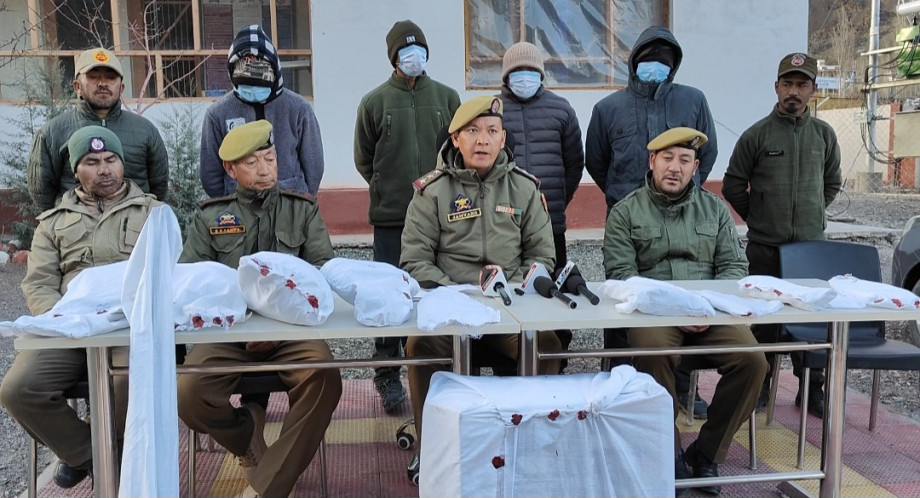Four arrested in Kanji Ibex poaching case, investigation underway

Four arrested in Kanji Ibex poachinIn a swift operation, the Wildlife Department and Ladakh Police arrested four individuals from Shakar Chiktan block, Kargil district, for their involvement in the poaching of a wild ibex, a protected species under the Wildlife Protection Act.
The accused have been identified as Abdul Hussain, S/o Mohammad Hadi, R/o Hagnis; Ahmed Ali, S/o Abdul Raza, R/o Shakar; Mohd Akbar, S/o Mohammad Hadi, R/o Hagnis and Nassir Ali, S/o Abbas Ali, R/o Chiktan.
The case has been registered at Police Station Khaltse under FIR No. 4/2025, Section 9/51 of the Wildlife Protection Act.
The incident came to light when local laborers working in Kanji valley heard gunshots and immediately alerted the Wildlife Department. Responding swiftly, a joint team of police and wildlife officials rushed to the site, where they found an injured ibex with gunshot wounds to its forelegs.
The poachers had already fled the scene, abandoning the wounded animal. A manhunt was launched, and all four accused were apprehended later the same night.
Speaking on the case, Inspector Jamyang Namgail, SHO Khaltse Police Station, stated, “As soon as we received the information, we acted immediately. Two teams were deployed—one to the crime scene and another to Khangral. The injured ibex, with both its forelimbs broken, was rescued and given immediate medical care.”
SHO Khaltse praised two women who reported the gunshots, calling their action crucial in ensuring a swift response.
“With the help of Kargil Police, we first arrested Abdul Hussain and seized his vehicle. Based on his confession, three other suspects were identified and subsequently arrested,” he added.
Authorities have confiscated multiple items, including, Dried meat, Chopping board and knives, Weapons and Animal fur and other materials. All seized items will be sent for forensic examination (FSL analysis).
The accused are currently under police remand, and further investigation is ongoing.
Sources indicate that the accused may have been involved in previous poaching activities, though authorities have stated that the case is still in its early stages, and further confirmation is awaited.
SHO Khaltse has urged the public to report any similar incidents, assuring that the police will act immediately on such information.
Poaching Cases in Leh
Several poaching cases have been reported in Leh over the years:
• November 25, 2008: A poaching case was reported from Raldong Nala near the Mahay Bridge area. Two individuals were arrested with weapons and the meat of dead animals, later confirmed by an FSL report as blue sheep meat.
• April 14, 2016: Three individuals, including two army personnel, were arrested for poaching Ladakh Urial (Shapo). A telescopic gun was seized from an army vehicle. The case was registered under FIR No. 15/2016, invoking Section 8/51 of the Wildlife Protection Act and Section 7/27 of the Indian Arms Act.
• December 11, 2016: A blue sheep poaching case was registered at Gya Meru Rong. Although the animal's body was recovered, the poachers remained unidentified. The case was registered under FIR No. 93/16, citing Section 8/51 of the Wildlife Act.
• December 18, 2019: Two individuals from Bogdang, Mehdi Ali and Ghulam Hassan, were identified for poaching blue sheep in Nubra Valley. Mehdi Ali later confessed to the crime.
• December 15, 2020: The poaching of a blue sheep at South Pullu near Khardung La sparked controversy due to the involvement of a Ladakh Police officer, Inspector Parvez Ahmed. The case was registered under Sections 9, 11, and 12 of the Wildlife Protection Act (1972). Ataullah Bhat, 39, a resident of Leh, was the prime accused arrested.
• May 13, 2021: A blue sheep was killed between Kairy and Nee village in Rong Changthang.
The Need for Stricter Laws
Despite legal provisions, poaching continues to be a serious issue in Ladakh. Strict enforcement of laws and harsher penalties against offenders are crucial to prevent such crimes and protect Ladakh’s fragile wildlife.





